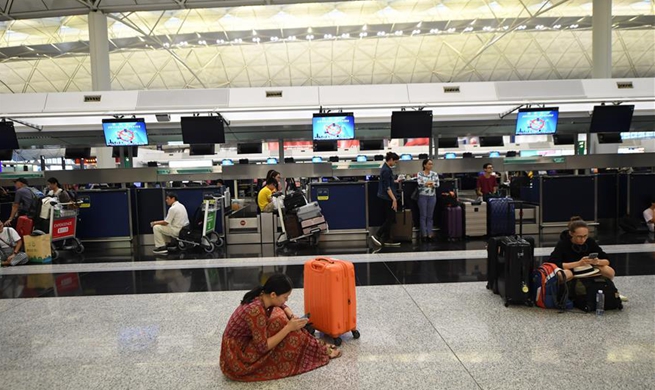ROME, Aug. 14 (Xinhua) -- Italian Deputy Prime Minister Matteo Salvini's push for new elections hit a stumbling block this week after the populist, anti-establishment Five-Star Movement began discussions with the main center-left party in hopes of avoiding a national vote nearly four years ahead of schedule.
Analysts said that Salvini, also head of the rightwing, anti-migrant League, is looking to capitalize on his party's strong levels of support to form a new government with Salvini himself in the prime minister's office.
Polls show that support for the League is approaching 40 percent of the electorate, well ahead of the Five-Star Movement, the League's coalition partner under current Prime Minister Giuseppe Conte.
Since the Conte government took power nearly 15 months ago, the League and the Five-Star Movement have repeatedly clashed over priorities ranging from economic policy to immigration law and from relations with the European Union to the fate of a 25-billion-euro (28-billion-U.S. dollar) high-speed train line under the Alps linking the Italian city of Turin and Lyon, France.
Last week, Salvini pulled the plug on the League's coalition with the Five-Star Movement, calling it "unrepairable."
The next general election is scheduled to take place in 2023. Before Italian President Sergio Mattarella calls new elections so far ahead of that date, other options will be explored. One that has emerged is the possibility of a new coalition between the Five-Star Movement and the Democratic Party along with the support of some second- or third-tier center-left parties.
Chances for that outcome are helped by the fact that any new coalition would use parliamentary representation from last year's general election and not based on current opinion polls. In last year's vote, the Five-Star Movement earned 33 percent of the vote, compared with 17 percent for the League. The Democratic Party got 19 percent.
Luigi Curini, a political scientist at the State University of Milan, said the match between the two parties is just one of the three ways the crisis could evolve.
"I see the possibility of an alliance between the Five-Star Movement and the Democratic Party as the least likely option and even if it worked those two parties might be at odds as often as the parties in the current government," Curini told Xinhua. "We could also see elections quickly, this year, or we could see the current government stay together and limp along until elections can be held six or nine months from now."
Parliamentary discussions have now been tabled until Aug. 20, when Conte will address parliament to make his case for staying on.
The odds are still in favor of Salvini and the League coming out on top, analysts said. According to Lorenzo Castellani, a professor of political institutions at Rome's LUISS University, the move to delay the vote could have been a strategic one on Salvini's part.
"This could be a way for it to seem like the Five-Star Movement is responsible for the eventual government collapse," Castellani said in an interview. "Very often, the party that brings a government down is punished for that when people go to the polls."
To avoid that, Salvini's move was to offer the League's support for a Five-Star Movement proposal to reduce the number of members of parliament from the current level of 945 to 600, though only at some distant date and only under the condition that new elections are held soon. If the Five-Star Movement refuses, they could be seen as forcing the government's collapse.
Opinion polls indicate the League would do well in snap elections. The party's support level of nearly 40 percent is about equal to that of the Five-Star Movement and the Democratic Party combined, with each of them polling at around 20 percent of the electorate.













